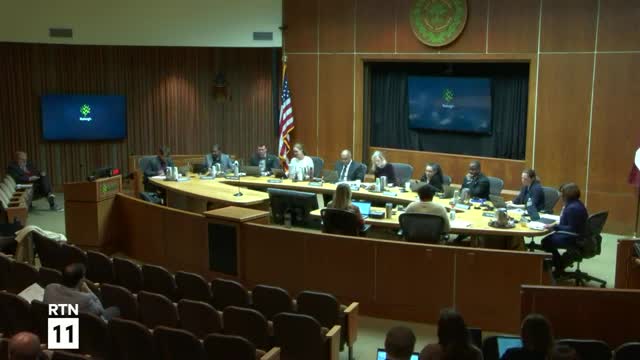Raleigh Council authorizes pilot crisis diversion line, advances Raleigh Cares program
Get AI-powered insights, summaries, and transcripts
Subscribe
Summary
City Council authorized a contract with Alliance Health to launch a crisis call diversion line and approved related budget transfers to advance the Raleigh Cares program, including timelines for Acorns staffing, care navigation hires and pilot launch dates.
Raleigh City Council on a voice vote authorized the city manager to execute a contract with Alliance Health to operate a crisis call diversion line and approved a budget transfer to support program start-up costs for a pilot.
The action advances Raleigh Cares, a multi-component program described by staff as separate from the Raleigh Police Department's ACORNS unit and intended to broaden non-police crisis response options. City staff told council the contract for the diversion line is for a pilot and that the not-to-exceed amount for the pilot is $546,114.
City Manager's Office staff member Michelle Millette told the council the Raleigh Cares program has three components and that council would receive updates on staffing and launch timelines. "Raleigh Cares itself is just Raleigh Cares and that includes 3 components," Millette said in her presentation. She said the city would show progress and data through a software dashboard the city contracted for, and stressed the separation in name and role between Raleigh Cares and the police department's ACORNS unit.
Millette provided program timing and staffing details: the ACORNS unit will be fully staffed by Feb. 1, the care navigation team (housed in Housing and Neighborhoods) aims to launch in May 2025, and the city expects to launch the crisis call diversion line on July 1, 2025. The diversion line model will place licensed clinicians inside Raleigh's 911 call center from 9 a.m. to 5 p.m.; outside those hours callers will be connected to Alliance Health clinicians who are not housed in the 911 center, the city said.
Millette described the pilot purpose and asked council to approve the Alliance contract and a budget transfer covering start-up training and equipment. When asked whether the $546,114 figure was an annual ask, Millette said, "That's for this pilot." Council members discussed hiring constraints for licensed clinicians and staff said they built a conservative timeline to allow for onboarding and embedding clinicians into call-center operations.
Dominic Nutter of the Department of Emergency Communications was named in the presentation as a partner in operational planning; Millette thanked the city attorney's office and the communications team for helping shape the program and its messaging. The city also plans training for 911 call takers and for police personnel who will interface with people experiencing behavioral health crises. Millette said the city will request funding for evaluation and training partners and for an enclosed trailer to carry supplies used in field outreach by ACORNS and partners.
Council members asked clarifying questions about 24/7 coverage and whether calls from outside Raleigh would be served. Millette said Alliance and Wake County had agreed to take calls from outside the city so callers will receive service, and that the city will only pay for Raleigh calls. Council member Patton clarified that the 9-to-5 staffed clinicians will be located in the 911 center and that connections outside those hours will still be available through Alliance.
Council member Hurst moved to authorize the city manager to execute the Alliance Health contract and to approve the requested budget transfer; the motion was seconded and carried by voice vote.
The manager's office said the city will host community touchpoints beginning in June 2025 and will provide program updates one month before and one month after launch. Staff also said the ACORNS dashboard software (named in materials as Gelada/Jalada) will provide data on touchpoints and client navigation once operational. The city will continue coordinating a separate mobile crisis response pilot with Wake County and other partners and return to council with details and any additional requests.
Council and staff repeatedly framed the approvals as pilots and underscored the city's intent to evaluate and adjust operations as the program scales.
Millette closed by thanking staff and partner organizations for work to stand up the program; council approved the contract authorization and budget transfer by voice vote.
